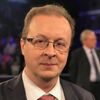MOSCOW, September 19 (RIA Novosti), Dmitry Babich — Ukrainian President Petro Poroshenko is touring the United States and Canada, addressing legislatures and getting standing ovations. The problem is, however, that such an enthusiastic reception in North America and the West in general is usually seen as sort of a bad omen for political leaders from the former Soviet Union.
Nearly ten years ago, the anti-Russian former president of Ukraine, Viktor Yushchenko, was met with the same ovations and flowers on both sides of the Atlantic. Within four years, however, Yushchenko’s presidency had led to a chain of conflicts inside Ukrainian society and he lost the next election, getting a humiliating 4 percent of the vote. The last Soviet president, Mikhail Gorbachev, lost power in 1991 when his popularity in the West was at its peak: “Gorby-mania” culminated in his getting the Nobel Peace prize in late 1990, just as wars were being fought in Nagorno–Karabakh and Moldova.
So much for the kind of leaders who get praise in the modern West and for the “objectivity” of all sorts of committees and endowments (Nobel and otherwise) which lavish praise and prizes on these persons.
Perhaps, instead of listening to Poroshenko’s pronouncements on his “historic” achievements, it makes sense to look at what is going on inside Ukraine. There the situation is remarkably similar to the one which Mr. Gorbachev faced in his native Soviet Union in 1991. A united Ukraine is quickly becoming an impossibility. Mr. Poroshenko is to blame; after his not-quite-fair election in May of this year (the east of Ukraine did not take part in the vote), he became the first Ukrainian leader since the seventeenth century to dispatch Ukrainian troops to fight other Ukrainians. The civil war in the east of the country called the existence of a united Ukraine into question. The events of last week sealed the country’s fate: it became clear that Ukraine’s eastern regions will not be represented in the “big” Ukraine’s Verkhovaya Rada (legislature), and this sealed the fate of “united Ukraine.”
Why did this happen? While Mr. Poroshenko was in the West, his Prime Minister Arseny Yatsenyuk declared that was not going to finance the rebel-held territories in the East (And it is an axiom that the state ends when the money stops flowing). On the top of that, the Party of the Regions (Ukraine’s strongest party under former president Yanukovich, who was violently toppled in February 2014) was harassed into taking the decision not to participate in the parliamentary elections scheduled for October 26. The Communist party of Ukraine is now essentially banned; its faction was expelled from the last parliament. These two new developments mean that the east of Ukraine, the traditional constituency of the “regionals” and communists, simply won’t have even the theoretical opportunity to be represented in the new parliament, which is due to be dominated by the people like the Donbas-bombing military pilot Nadya Savchenko (number one on Yulia Tymoshenko’s Fatherland party list) or the commanders of Donbas-fighting National Guard battalions (two of them are in the top ten in Arseny Yatsenyuk’s People’s Front party).
Until 2014, Ukraine was held together by its democracy. Dysfunctional and corrupt as it was, this democracy allowed the East to elect presidents (Leonid Kuchma, Viktor Yanukovich) and Verkhovaya Rada deputies which promised to represent its interests. This allowed the East to hold the West of the country in check. Western Ukraine is much more active and sometimes violent; it is traditionally dominated by Ukrainian nationalists, who have a long history of grievances against Russia and Poland.
But the last parliament to represent a united Ukraine, which had been democratically elected by both East and West of Ukraine in 2012, was occupied and subdued by the so called “peaceful” Maidan activists in February of this year. Minutes after the Maidan activists entered the Rada building, the last Rada to represent a united Ukraine changed its voting patterns by 180 degrees. Even the liberal faction of the Ukrainian press (for example, Kommersant-Ukraina daily) had to acknowledge that this change hadn’t happened without the menacing influence of the Maidan activists. (For those who still believe these were “peaceful protesters”, a quick Internet search with the words “Kiev” “Molotov cocktails” and “policemen burnt alive” might be helpful.)
Policemen, however, were not the main object of this “peaceful” hatred. The main targets were the leaders and members of the Party of Regions (especially Yanukovich) and the members of the communist faction. The homes of several leaders of the Party of the Regions (Oleg Tsaryov, Vadim Medvedchuk, etc.) were set on fire; the party offices of communists were also routinely ransacked and burnt. The leader of the Communist party of Ukraine, Pyotr Simonenko, was physically assaulted inside the Rada by extremist nationalist deputies – without any legal consequences for them.
In this situation, the only way people in the east of Ukraine (in Donetsk and Lugansk, primarily) can preserve their rights and security is by declaring their own state and steering clear of Mr. Poroshenko’s “united Ukraine,” which has become an alien country for them during the last six months.
And this is the truth that Mr. Poroshenko will never tell his hosts in the US and Canada. Well, he is not the first. Gorbachev also “forgot to mention” during his visits in 1991 that the Soviet Union was finished.
The views expressed in this article are solely those of the author and do not reflect the official position of Sputnik.



